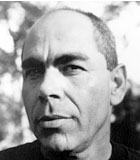As Life Was Five Poem by Jimmy Santiago Baca
As Life Was Five
Portate bien,
behave yourself you always said to me.
I behaved myself
when others were warm in winter
and I stood out in the cold.
I behaved myself when others had full plates
and I stared at them hungrily,
never speaking out of turn,
existing in a shell of good white behavior
with my heart a wet-feathered
bird growing but never able to crack out of the shell.
Behaving like a good boy,
my behavior shattered
by outsiders who came
to my village one day
insulting my grandpa because he couldn't speak
English
English-
the invader's sword
the oppressor's language-
that hurled me into profound despair
that day Grandpa and I walked into the farm office
for a loan and this man didn't give my grandpa
an application because he was stupid, he said,
because he was ignorant and inferior,
and that moment
cut me in two torturous pieces
screaming my grandpa was a lovely man
that this government farm office clerk was a rude beast-
and I saw my grandpa's eyes go dark
with wound-hurts, regret, remorse
that his grandchild would witness
him humiliated
and the apricot tree in his soul
was buried
was cut down
using English language as an ax,
and he hung from that dead tree
like a noosed-up Mexican
racist vigilante strung up ten years earlier
for no other reason than that he was different,
than that they didn't understand
his sacred soul, his loving heart,
his prayers and his songs,
Your words, Portate bien,
resonate in me,
and I obey in my integrity, my kindness, my courage,
as I am born again in the suffering of my people,
in our freedom, our beauty, our dual-faced,
dual-cultured, two-songed soul
and two-hearted
ancient culture,
me porto bien, Grandpa,
your memory
leafing my heart
like sweetly fragrant sage.
But the scene of my grandpa in that room,
what came out of his soul
and what soared from his veins,
tidal-waving in my heart,
helped make me into a poet
singing a song that endures and feeds
to make my fledgling heart
an eagle,
that makes my heavy fingers
strum a lover's heart and
create happiness in her sadness,
that makes the very ground in the prairie
soil to plant and feed the vision of so many of us
who just want to dance and love and fly
that makes us loyal to our hearts
and true to our souls!
It's the scene
that has never left me-
through all the sadness
the terrors
the sweet momentary joys
that have blossomed in me,
broken me, shattered my innocence
I've
never forgotten the room that day,
the way the light hazily filtered in the windows,
the strong dignified presence of my grandfather
in his sheepskin coat and field work boots,
that scene,
the way the boards creaked under his work boots,
haunted me
when my children were born at home
and my hands brought them into this world,
that scene was in my hands,
it echoed in my dreams, drummed in my blood,
cried in my silent heart,
was with me through hours of my life,
that man behind the counter,
his important government papers rattling in the breeze,
disdainful look on his face,
that scene, the door, the child I was,
my grandpa's hand on the doorknob, his eyes on me like a voice
in the wind
forgiving and hurtful and loving,
to this moment-
his eyes following me
where I swirl in a maddened dance
to free it from my bones,
like a broken-winged sparrow yearning for spring
fields,
let the scene go, having healed it in my soul,
having nurtured it in my heart, I sing its flight, out, go,
fly sweet bird!
But the scene that dusty day
with the drought-baked clay in my pants cuffs,
the sheep starving for feed
and my grandfather's hopes up
that the farm-aid man
would help us as he had other farmers-
that scene framed in my mind, ten years old
and having prayed at mass that morning,
begging God not to let our sheep die,
to perform a miracle for us
with a little help from the farm-aid man,
I knew entering that door,
seeing gringos come out smiling with signed
papers to buy feed,
that we too were going to survive the
drought;
the scene with its wooden floor,
my shoes scraping sand grains that had blown in,
the hot sun warming my face,
and me standing in a room later
by myself,
after the farm-aid man turned us down
and I know our sheep were going to die,
knew Grandfather's heart was going to die,
that moment
opened a wound in my heart
and in the wound the scene replays itself
a hundred times,
the grief, the hurt, the confusion
that day changed my life forever,
made me a man, made me understand
that because Grandfather couldn't speak
English,
his heart died that day,
and when I turned and walked out the door
onto Main Street again,
squinting my eyes at the whirling dust,
the world was never the same
because it was the first time
I had ever witnessed racism,
how it killed people's dreams, and during all of it
my grandfather said, Portate bien, mijo,
behave yourself, my son, Portate bien.
This poem has not been translated into any other language yet.
I would like to translate this poem